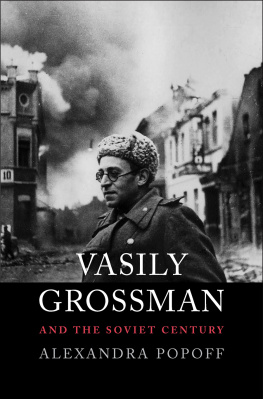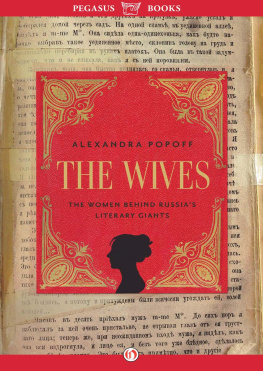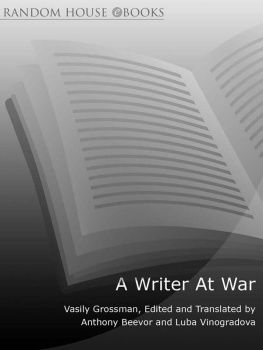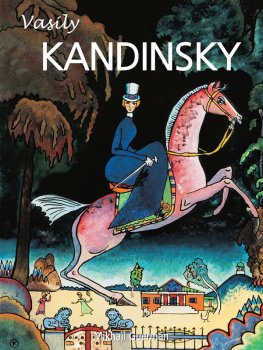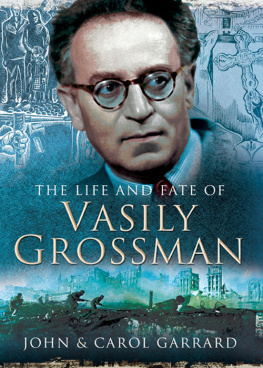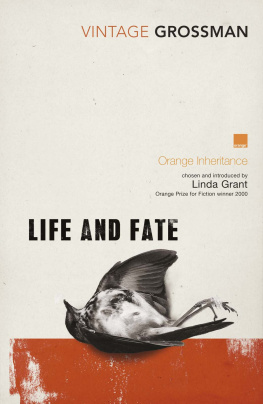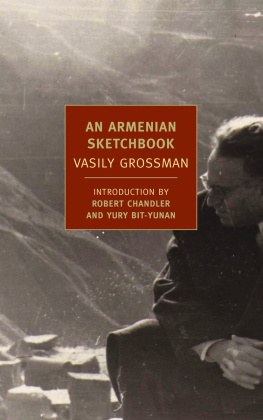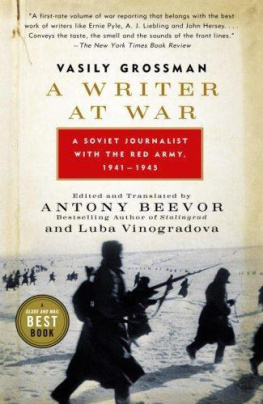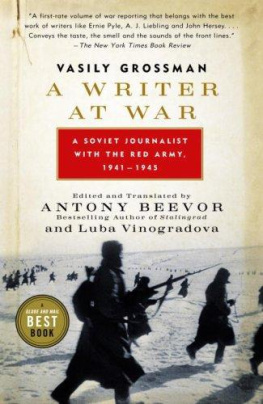Vasily Grossman
and the Soviet Century

Published with assistance from the foundation established in memory of Calvin Chapin of the Class of 1788, Yale College.
Copyright 2019 by Alexandra Popoff.
All rights reserved.
This book may not be reproduced, in whole or in part, including illustrations, in any form (beyond that copying permitted by Sections 107 and 108 of the U.S. Copyright Law and except by reviewers for the public press), without written permission from the publishers.
Yale University Press books may be purchased in quantity for educational, business, or promotional use. For information, please e-mail (U.K. office).
Set in Fournier MT type by IDS Infotech Ltd.
Printed in the United States of America.
Library of Congress Control Number: 2018955015
ISBN 978-0-300-22278-4 (hardcover : alk. paper)
A catalogue record for this book is available from the British Library.
This paper meets the requirements of ANSI/NISO Z39.481992 (Permanence of Paper).
10 9 8 7 6 5 4 3 2 1
His daring, his frankness were drawn from his very despair.
So was his revolt.
Elie Wiesel, Souls on Fire
Contents
Preface and Acknowledgments
In 2014, during the International Grossman Conference in Moscow organized by the Study Center Vasily Grossman in Turin, I first realized that the legacy of this writer equally concerns scholars from Russia, Italy, Germany, England, and the United States. During the conference I discussed this book with Robert Chandler, the major translator of Grossmans works into English. I am grateful to him for permission to quote his translations of Grossmans prose and for the encouragement and expert advice he offered upon reading my manuscript. I also want to thank the author and literary scholar Joshua Rubenstein for his valuable comments. This book is more accurate owing to the contributions of Peter Crane, author and historian, whose suggestions were both meticulous and insightful.
I want to thank Ekaterina Korotkova-Grossman, who shared stories about her father. Our conversations at her Moscow apartment, which Grossman had visited, had special meaning. In Baden-Baden, Germany, I interviewed the writers stepson Fyodor Guber, a major surviving witness of Grossmans life. I am thankful to Guber and his wife, Irina Novikova, for answering my queries and for permission to use letters and photographs from their archive. Irina, who was with Grossman during the confiscation of Life and Fate by the KGB, shared this and other stories. The couples daughter, Elena Kozhichkina, who accommodates Grossmans library and memorial study at her Moscow apartment, spoke fascinatingly about her grandmother, Grossmans second wife. Elenas meticulous descriptions of Grossmans original study are employed in this book.
I am indebted to Maria Loboda (Karpova) and her sister Lyudmila Efremova, both of whom met Grossman in adolescence. The Loboda family risked their safety preserving the final draft of Life and Fate for three decades. (This was a portion of the writers archive the KGB never found.) Marias stories and her mothers unpublished memoir shed light on Grossmans sources; photographs from their family archive were also invaluable.
My thanks go to Alexander Zelinsky for permission to reproduce the previously unpublished photograph of Grossman from Kornely Zelinskys private archive. I owe thanks to Natalya Zabolotskaya, the daughter of Grossmans friend the poet Nikolai Zabolotsky, for clarifying information that led me to discover Grossmans major source on Ukraines famine. Her blunt refusal to speak about Grossman, her familys neighbor, was also illuminating. It revealed the depth of emotion over her mothers affair with the writer in the 1950s.
Im indebted to Elena Surits for sharing her recollections of Grossman, who was her parents closest friend; to Tatyana Sharapova, who told of her meeting with Grossman and his genuine interest in people and their stories; to Arnold Sharapov, who recommended literature indispensable for this book; to Elena Makarova, for permission to reproduce photographs of her stepfather (and Grossmans close friend) Semyon Lipkin. Im also grateful to the Russian journalist and director Elena Yakovich, who told of how in 2013, during the shooting of her biographical film about Grossman, the FSB (the successor to the KGB) finally released the arrested manuscripts of Life and Fate to the public domain.
My deepest thanks go to the Memorial International, a Russian human rights organization in Moscow; to the late historian and human rights activist Arseny Roginsky, with whom I discussed parts of this book; to Irina Shcherbakova of Memorial International, who recommended literature on Stalins repressions; and to Svetlana Fadeeva, who suggested using the drawings of Thomas Sgovio, former Gulag inmate, American artist, and author of Dear America! Why I Turned against Communism. Tatyana Goryaeva, director of the Russian State Archive of Literature and Art, and other curators of this archive have accommodated my research over the years. I am equally grateful to curators of the V. I. Dahl State Museum of the History of Russian Literature (State Literary Museum) for permission to reproduce Grossman photographs from their rich collection. My special thanks go to Alexei Nevsky, the museums deputy director; Vasily Vysokolov, head of the photo department; and Evgeniya Varentsova, head of the manuscript department, who accommodated my research concerning the final draft of Life and Fate.
I am indebted to my husband, Wilfred, for his editing, shared interest, and unfailing support for my book, which took years to produce. And Im grateful to my editor at Yale University Press, Jaya Chatterjee, and copy editor Robin DuBlanc, for their faith in my project and hard work. Finally, this book would have been impossible without grants from the Canada Council and the Saskatchewan Arts Board.

A number of important translations and studies have become available in the West within the last decade or two. These include Frank Elliss Vasily Grossman: The Genesis and Evolution of a Russian Heretic and Carol and John Garrards biography The Bones of Berdichev: The Life and Fate of Vasily Grossman. Robert and Elizabeth Chandler have made superb translations of Everything Flows, a collection of Grossmans short prose, The Road, and An Armenian Sketchbook. Having brought Life and Fate to the English-speaking reader, Robert Chandler is also about to launch his translation of the novel For the Right Cause (it will appear under Grossmans original title, Stalingrad). Antony Beevors remarkable book A Writer at War explores Grossmans writings and the notebooks he kept as a war correspondent. The authors expert commentaries deepened my understanding of a writer at war.
As Patrick Finney points out, the multifaceted character and richness of Grossmans work explains why historians, philosophers, political theorists, and Holocaust scholars have turned to Grossman for the insights of unparalleled acuity and sensitivity that he offers into some of the central horrors of the totalitarian centuryfrom the Stalinist Terror of the 1930s, to the brutal Eastern Front warfare of the Second World War, to the Holocaust. Grossmans account of the war and the Stalingrad battle informed Beevor in his best-selling history Stalingrad. Timothy Snyder employed Grossman as a source in Bloodlands: Europe between Hitler and Stalin. Earlier, The Complete Black Book of Russian Jewry
Next page
